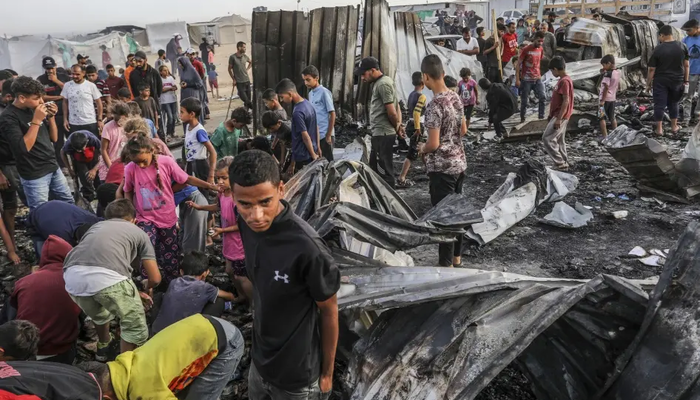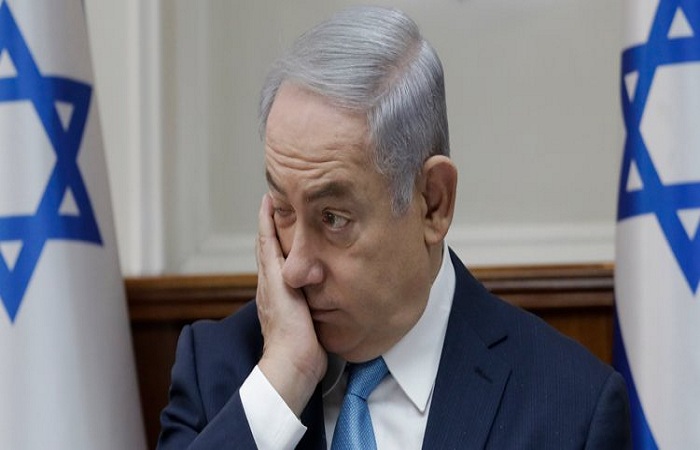As the Israeli siege on Gaza enters its 60th day with no food, water, or medical aid allowed in since March 2, the United States defends Israel’s actions at the International Court of Justice.
Human rights groups warn of a deepening humanitarian catastrophe as global calls for urgent relief intensify.
Israel’s total blockade of Gaza has reached its 60th day, as the International Court of Justice (ICJ) in The Hague holds the third day of hearings on Israel’s humanitarian obligations to Palestinians.
No food, water or medical supplies have been allowed into the war-torn Gaza Strip since March 2, days before Israel broke the ceasefire on March 18 to restart the bombardments and ground assaults that have killed more than 52,000 Palestinians in the enclave since October 7, 2023.
The United Nations has warned of “full-scale famine conditions” across the Strip and called for “concerted” action to stop the “humanitarian catastrophe” there.
The UN’s World Food Programme says all of its bakeries have shut down and all of its stocks inside Gaza have been fully depleted.
Putin and Qatar’s Emir Discuss Syria and Gaza in Moscow Talks
According to a report by the UN Office for the Coordination of Humanitarian Affairs (OCHA), widespread forced displacement has forced many people to abandon food supplies and emergency stocks secured during the ceasefire signed in January.
Furthermore, most people cannot bake for themselves due to acute shortages of cooking fuel and the soaring cost of wheat flour, the report said.
People are also forced to rely on aid supplies as farmers and breeders cannot access their land, as 70 percent of the enclave has been designated as a “no-go” area or is under displacement orders by the Israeli military, the report added.
The remaining soup kitchens in Gaza say they may have to shut down within days unless aid is allowed in.
As a result, some families are resorting to eating “whatever they can find”, even if it is not safe for consumption, according to the UN agency for Palestinians, UNRWA.
Meanwhile, a spokesperson for the WFP told that “aid trucks [are] stuck at the border waiting to enter Gaza”.

In addition, prices inside the enclave have skyrocketed by more than 500 percent, says NGO Mercy Corps, which warn that Gaza’s food systems could collapse entirely unless borders open immediately.
The world’s hunger watchdog, known as the Integrated Food Security Phase Classification (IPC) system, has begun an analysis of the lack of food and malnutrition in the Gaza Strip.
The assessment began on April 28 and will last one week, according to OCHA. More than 50 trained analysts from UN agencies and aid groups, from the Gaza Strip and abroad, are taking part in the exercise, it said.
Israeli Strikes on Gaza Media and Medical Teams Raise War Crime Allegations
The IPC had issued at least four warnings since Israel’s genocidal actions on Gaza began, saying the territory could be teetering on the precipice of famine.
Hospitals are also overwhelmed by the large influx of patients and injuries, and medical staff warn that many are dying due to the shortage of medical supplies.
“Medical staff warn there are many more dying quietly inside emergency words of the remaining health facilities due to the shortage of medical supplies. Medications as simple as painkillers are not available,” he said.
The president of the Palestine Red Crescent, Younis al-Khatib, called for sanctions to be imposed on Israel as it “left no space for humanity to live in Gaza.”
“I can’t see my colleagues, my friends, and my staff being killed by a state that does not respect our emblem, does not respect international law,” al-Khatib told.
“If any other state had done it, it would have been sanctioned.”
Meanwhile, in The Hague, the top court of the United Nations was holding a third day of hearings on what Israel must do to provide humanitarian assistance to Palestinians in Gaza and the occupied West Bank, following a request for an advisory opinion from the UN General Assembly last year.
Germany, France, UK Urge Israel to Allow Unhindered Humanitarian Aid into Gaza
The United States defended Israel on Wednesday, saying that while it must provide aid to Gaza, it does not have to work with UNRWA. Israel banned the agency from operating on its territory in January, after alleging that 19 out of approximately 13,000 staff took part in Hamas’ attack in southern Israel on October 7, 2023.
Josh Simmons, a legal adviser from the US State Department, argued there was “no legal requirement that an occupying power permit a specific third state or international organisation to conduct activity that would compromise its security interests.”
Simmons suggested other organisations could fulfil UNRWA’s mission, despite the UN agency having repeatedly stated that there could be no replacement for its role as an aid provider to 2.3 million people.

Similar points were raised by Hungary as it took the floor in defence of Israel.
The Russian Federation, which spoke directly after the US, said that UNRWA’s work was crucial for the Palestinian people and the agency was supported by the majority of the international community.
“The urgency of this matter cannot be overstated. Gaza balances on the brink of famine. Hospitals lie in the ruins. Millions of Palestinians in the [Gaza] strip, as well as in the West Bank and East Jerusalem face existential despair,” Maksim Musikhin, of the Ministry of Foreign Affairs, told the court.
US, Israel Plan to Relocate Palestinians from Gaza to East Africa
Other countries including Turkey, France, Indonesia, Iran, Jordan and Kuwait were expected to speak against Israel’s aid blockade before the end of the day.
Challands said the statements heard by the court in the first two days had all been critical of Israel’s actions. “It was only at the beginning of the third day that a country turned up and spoke in defence of Israel – and that of course was the US,” the reporter said.



